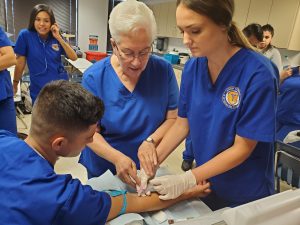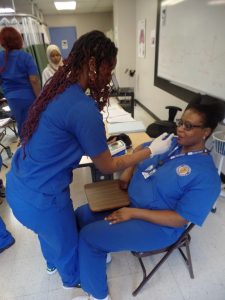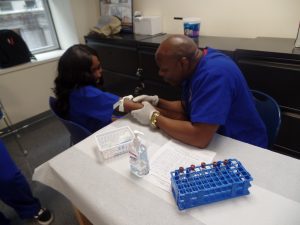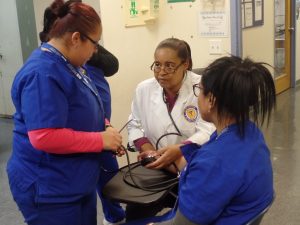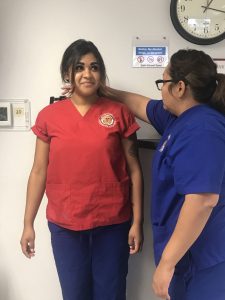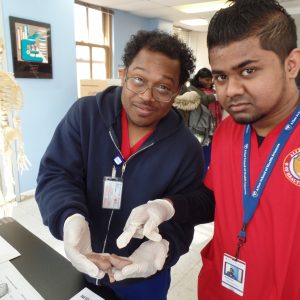
What is a Medical Assistant?
Ask yourself what you imagine a Medical Assistant does. You will be surprised how many people get it wrong. If you expect medical assistant schooling to prepare you for changing bed pans or carrying out menial administrative tasks, your impression of this role doesn’t go deep enough. The Clinical Medical Assistant is a true chameleon of the healthcare industry. As a group, Medical Assistants demonstrate a range of talents that involve clinical as well as administrative tasks.
Medical Assistants Wear Many Hats
Medical assistant education requirements do not mention the need to be adaptable, but this is an important asset. MAs play many different roles in their jobs. They may be required to discuss medical records with a doctor one moment, and then draw blood from a nervous patient the next moment. The language used for each of these encounters is very different – one is academic, the other emotional. A medical assistant knows that it’s just as important to care for a patient while blood samples are being taken as it is to be responsible for medical records and files. Busy and varied, this is an enthusiastic role that requires flexibility and commitment. MAs have these qualities in spades.
Medical Assistants play a vital role in their team
A doctor needs a Medical Administrative assistant like a hamburger needs fries. Medical assistant classes prepare MA’s for being one of the first faces a patient might see when arriving at a hospital or physician’s office. The MA is responsible for checking the patient’s vital signs and preparing them for what happens next. Equally, a doctor is reliant on the information provided by the MA. The MA’s assistance in preparing the patient or clinic is essential for the doctor to be able to start work. In other occupations, you’ll see company directors who rely on their personal assistants to help make or break a deal, or professional athletes who count on their trainers to help them stay in the best shape possible. These types of professional duos take joint credit for their success stories. For healthcare professionals, the outcome can be life or death. Within the hospital or clinic, both roles are crucial for delivering seamless healthcare to patients.
They Have Hidden Talents on and Offline
MA’s certainly don’t need to be computer geniuses, but there is no shortage of opportunities to utilize their tech skills. Now that patient records are electronic, healthcare workers are constantly brushing up on their IT knowledge as they go about their everyday work. Workers in medical assistant jobs use computers for all kinds of routine tasks such as scheduling appointments, bookkeeping, or dealing with insurance companies. The use of technology means records are more accurate and the person using it saves a heap of time. In the past, manual entry of patient records was laborious and would slow down the process. Today with the use of electronic medical records, the process is much more streamlined.
Some MA’s relish the use of technology to make work processes faster or more efficient, while others only use computerized systems and tools as required. Much of this kind of training can happen on the job. Using digital equipment becomes another part of the day-to-day activity, like complying with security measures or health and safety regulations. Becoming a medical assistant can mean being as much a part of a digital world as it does to deliver face-to-face, practical, and hands-on assistance.
MA’s Are Everywhere!
Medical assistant programs prepare you for the role, but the job itself can be based anywhere. This is one of the most attractive features of working as an MA. Medical assistants can work in hospitals, a doctor’s office, or in a variety of other healthcare centers. Throughout a career, it’s possible to try out different settings to find out which is the most enjoyable or challenging for you. Being able to move around easily can help with relocation issues or other practical considerations as well. Working in a large or busy hospital will offer a very different experience from working in a small family practice. For instance, in a hospital, the staff will interact with many different people at all levels and from various walks of life. Working closely with the same group of people at a small doctor’s office lets you get to know your colleagues and patients better. Which setting is more appropriate will depend on the individual. Medical assistant courses and networking along the way will help to provide a taste of what each place might have in store, but freedom to choose is a powerful motivator for job seekers.
Medical Assistants Have Options
MA’s will reach many forks in the road. Often, they can take the opportunity to specialize in areas they are passionate about. This may be a lifelong passion or a growing interest during the advancement of a medical career. When certified medical assistant training is over, they may be inspired by a colleague, an establishment, or general advancements in healthcare. If they begin to suspect they’re not yet in the right role, MA’s can specialize in several different areas. Those who enjoy interaction with patients can move into patient care. For some individuals, clinical duties are more inspiring than clerical duties, but others may prefer keeping medical records or managing billing information. For more hands-on assistants who are fascinated by drawing blood and visiting the lab, phlebotomy is a common choice.
They Set Their Schedule
Medical assistant schools welcome students from all backgrounds, which makes this a popular career choice. You will be amazed at how diverse the range of motivations that lead students to train for this career. Some students might be working towards a medical assistant certificate around full-time work, family, or another study. A young adult may have wanted to work in healthcare for as long as they can remember – this is the first step in that process. A recent high school graduate could be training alongside a seasoned office worker who wants a completely new career. The beauty of the Allen School of Health Sciences is that there are courses that run both during the daytime and during the evening to accommodate every situation.
How long is medical assistant training?
Medical assistant training does not take as long as you might think. The Allen School’s accelerated program will take less than a year to complete. Anyone in a medical assistant training program is working towards their dream job, so you know these students are determined to get that job.
How to Become a Certified Medical Assistant
With so many MA’s working in such a variety of positions, it’s easy to forget they must all begin with the basics. Training covers a variety of things such as hospital admissions, updating records, using lab services, drawing blood, and monitoring EKG machines.
Interested in learning more about developing the skills and attributes of a medical assistant? Ready to start a Medical Assistant Program? Contact the Allen School today! We are enrolling now for our fall classes and cannot wait for you to become part of the Allen School family. Visit www.allenschool.edu to learn more.
-Allen School
Article updated April 5, 2024

